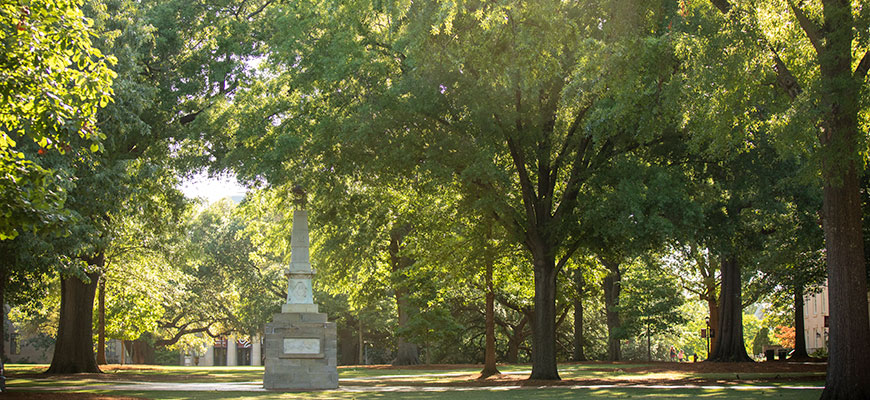
Arts and Sciences offers semester of justice
Course lineup includes new and existing courses relevant to society today
Posted on: July 9, 2020; Updated on: July 9, 2020
By Annika Dahlgren, annikad@email.sc.edu
This fall, the College of Arts and Sciences begins its new themed semester initiative that encourages faculty and students from across the university explore ideas related to a core subject. Last fall, Arts and Sciences faculty members had the chance to submit proposals for what the topic would be, and after reviewing many entries, the college is dedicating its first theme semester to justice.
The theme is meant to combine work from the arts, humanities, social sciences and natural and mathematical sciences to bear on challenging issues and problems. It will feature academic courses, public lectures, films, exhibits, discussion panels and other co-curricular activities. The goal is to enrich the educational experience of students both within and outside the College of Arts and Sciences.
It is safe to say that the year 2020 has not gone according to anyone’s plan. From experiencing a pandemic to public demonstrations supporting inclusion and diversity, the year's events have offered many opportunities for growth and strength.
The fight for environmental justice is as much about demanding that all people — regardless of income, race, geography, gender — have the right to live in a healthy and clean environment as it is about the ways forms of systemic racism manifest in the siting of toxic facilities.
Monica Barra, anthropology professor
“2020 will be forever written in the history books. The addition of a themed semester towards social justice couldn't come at a more perfect time, and I’m so excited to be a part of a college that saw value in these topics last year,” says Issy Rushton, student body president and a student in the College of Arts and Sciences. “With a push for more robust diversity and inclusion efforts and with a global pandemic looming over the future of our country, these classes will graduate worldly students who are ready to advance the nation and grow into contributing community members.”
The theme semester will offer opportunities for students, faculty and community members to engage in debate, inquiry and conversation about issues of justice relevant across arts and sciences disciplines. Both students and professors are as excited about this initiative.
“The fight for environmental justice is as much about demanding that all people — regardless of income, race, geography, gender — have the right to live in a healthy and clean environment as it is about the ways forms of systemic racism manifest in the siting of toxic facilities,” says assistant professor Monica Barra, who will teach a class on environmental justice this fall. “The course emphasizes the ways communities experiencing environmental harm and discrimination pursue and define social justice against the backdrop of persistent racial, economic and political inequalities.”
The following are some of the remaining available classes that students have the option of taking this fall. These are just a few of the options available for the College of Arts and Sciences Theme Semester. For students who are interested in participating, registration is on a first-come-first-serve basis. Sign up soon for a class that is designed to challenge you in and out of the classroom.
ANTH 277
Forbidden Archaeology: Fantasies, Frauds, and Mysteries of the Human Past. Taught by Eric Jones, this class will explore three major fraudulent ideas about the human past — all connected to this semester's theme of justice — and evaluate them using the theories and methods of archaeological science. Students will explore the connections between white supremacy, colonialism and imperialism and fantastic claims about ancient aliens and lost civilizations, such as Atlantis. The class will also cover how pseudoarchaeology has been used for nationalistic purposes, including the promotion of violent conquest and genocide and to dispossess native societies of land and cultural property.
CRJU 591
Miscarriages of Justice. Taught by Deena Isom Scott, this course will provide a broad investigation into the constructs of justice and the realities of errors in justice. It will highlight three central themes — lynching and racial terror, capital punishment and wrongful convictions — though other forms of miscarriages of justice will also be discussed. This course will provide a critical and interdisciplinary examination of the historical and current functioning of the American criminal justice system. The course will challenge students to analyze the historical roots of contemporary forms of racial profiling, vigilantism and state control.
ENVR 348 / AFAM 348
Environmental Justice. Taught by Monica Barra, this course will focus on the emergence of the environmental justice movement in the United States and its transformation into a global social movement to address political and environmental inequality from the mid-20th century to the present. The class will explore local and global case studies of environmental injustice and follow how different communities confront environmental discrimination on the basis of race, class, gender and geography.
GEOG 310
Making Geography. Taught by April Hiscox, this course is a holistic introduction to geography. While the topics will be diverse, students will spend two weeks discussing the history and effectiveness of addressing social justice through arts.
GEOG 321
Sustainable Cities. Taught by Conor Harrison, this course explores the social, environmental and economic aspects of making cities more sustainable. This class is a recipient of the 2020 Theme Justice grant to incorporate citizen science efforts around detecting natural gas leaks in urban environments.
MATH 399/599
Voting and Elections. Taught by Scott Dunn, a fundamental part of this course will be looking at the justice aspect of elections — gerrymandering, voter suppression and various constitutional amendments. This class is perfect for people interested or invested in the upcoming 2020 election.
Share this Story! Let friends in your social network know what you are reading about